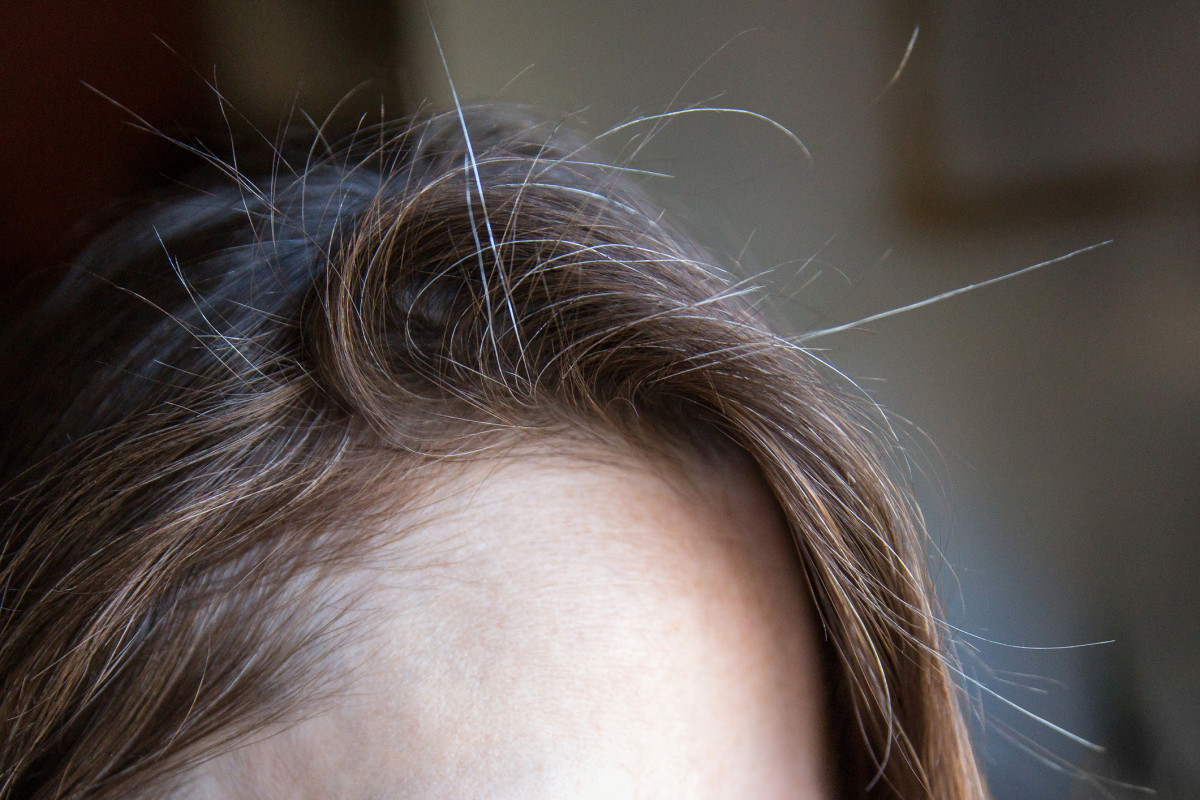Should You Worry About Plucking Gray Hairs?

Stress may be figuratively causing you to "rip your hair out," but should you literally do it if you have gray hair? One board-certified dermatologist constantly fields questions about mane color, including whether to pluck gray hair , and can empathize.
" Gray hairs often evoke strong emotions in people because they are a sign that one is not as young as they once were and can make people feel 'old,'" shares Dr. Arjun Dupati, MD , a board-certified dermatologist at Apollo Dermatology. "As one patient told me, 'My gray hair makes me look like my dad shortly before he passed away.'"
It's understandable if you want to eliminate gray hair, but dermatologists have strong feelings about plucking it. They discuss the risks of plucking gray hair and better ways to show your preferred (or true) colors.
🩺 SIGN UP for tips to stay healthy & fit with the top moves, clean eats, health trends & more delivered right to your inbox twice a week 💊
OK, Why Does Hair Go Gray in the First Place?
Dermatologists say the reasons for graying can vary, and some people may be experiencing multiple factors contributing to a lack of color.
"Without doubt, this is one of the most common questions my patients ask me," shares Dr. Dupati. "Melanocytes are melanin, or color-producing cells in the skin and hair follicles. As we age, melanocytes gradually decrease the amount of melanin pigment they produce. Melanin is responsible for hair color. As the amount of melanin decreases, the hair slowly becomes white, silver or gray."
Dr. Camila Antia, MD, a board-certified dermatologist and co-owner of The Skin People, agrees that melanin is at the "root" of graying hair (her words, not ours, but we see what she did there).
"Genetics and aging are the two more 'natural' causes, but stress, medical conditions and nutritional profile play a part," she explains. Research, including a 2023 review published in Ageing Research Reviews , also consistently points to aging and genetics as the primary factors contributing to graying locks.
Related: This 1 Common Health Habit May Actually Accelerate Aging, According to a Longevity Doctor and RD
Should You Pluck Gray Hair?
Often, experts talk about a gray area—or a middle ground—but they cut right to the chase with this one: Don't pluck gray hair.
"Plucking gray hairs won’t solve the issue—in fact, it can damage the hair follicle," stresses Dr. Viktoryia Kazlouskaya, MD, Ph.D., a dermatologist.
Dr. Dupati agrees, sharing more on precisely how pulling out gray hairs can do more harm than good. "Plucking a hair can damage the hair follicle by causing inflammation, potential infection and even permanent hair loss," he says. "Sometimes plucked hairs grow back at an irregular angle, causing an increase in ingrown hairs."
OK, but at least the hair regrows, right? Maybe at first.
"If you pluck a hair occasionally, it may regrow, but repeated plucking can traumatize the follicle, leading to permanent damage," Dr. Kazlouskaya reveals.
Related: I’m a Dermatologist—This Is the One Product I Can't Live Without
When Graying Isn't Normal
Generally, graying is a natural and unavoidable part of aging. Dermatologists say that you may start noticing grays sooner than a pal, especially if it's common in your family. There's no hard-and-fast answer to what qualifies as "early graying."
"If everyone in your family starts going gray in their 20s, that might be normal for you," Dr. Kazlouskaya says. "For example, I started seeing gray hairs in my mid-20s, which is seen in all generations on my father’s side."
Related: I'm Martha Stewart's Dermatologist—These Are The 3 Products I Recommend for Glowing Skin at 83
See? Even dermatologists go gray. Still, you should always feel comfortable addressing concerns if you think you're graying too soon.
"If gray hair isn’t common in your family, it’s a good idea to talk to your primary care provider," Dr. Kazlouskaya explains. "They may recommend checking for nutritional deficiencies , like B12 or iron, thyroid disorders or lifestyle factors, such as smoking. Certain medications can also contribute to premature graying."
If your gray hair is simply a natural sign of aging, you still have healthier options than plucking it. " Shampoo and hair dye can be used to dye the hair temporarily," Dr. Antia says. "Pigment loss in hair often results in coarser strands that make it harder for color to bond."
However, you don't have to use products if you don't want to, and you can stop at any time. "As a 37-year-old board-certified dermatologist, I have some gray hairs of my own with many more to come soon, I'm sure," Dr. Dupati says. "I plan to embrace them as they increase in number. Each stage of life brings new changes, both good and bad, but gray hairs are to me a sign that I am fortunate enough to live long enough to experience them."
Related: This Simple Diet Change Could Help Prevent Gray Hair, According to a Hair Restoration Expert
However, Dr. Antia points out that it can be more challenging for women to embrace grays because of expectations. She hopes to see society change its tune on that one, for her patients' and her own sake.
"It is also completely OK to embrace the grays," she shares. "As someone who has some grays myself, I wish it held the same cultural meaning for women as it does for men. Too often, it is seen as wisdom in men and simply getting old in women."
Up Next:
Related: Science Just Shattered a Major Myth About Aging and Muscle Recovery
Sources:
- Dr. Arjun Dupati, MD , a board-certified dermatologist at Apollo Dermatology
- Genetics of hair graying with age. Ageing Research Reviews .
- Dr. Camila Antia, MD, a board-certified dermatologist and co-owner of The Skin People
- Dr. Viktoryia Kazlouskaya, MD, Ph.D., a dermatologist
Post a Comment for "Should You Worry About Plucking Gray Hairs?"
Post a Comment